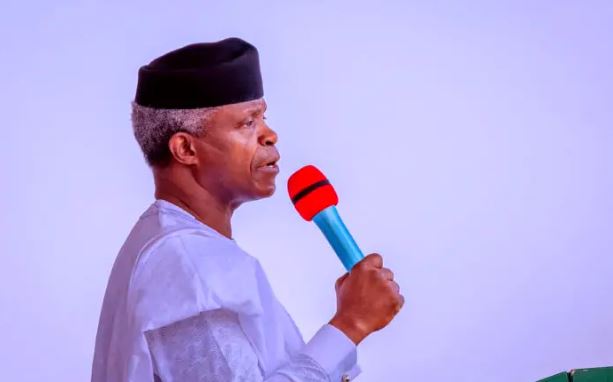The Real Reasons Why Yemi Osinbajo Lost APC Presidential Primary
Posted by Samuel on Wed 08th Jun, 2022 - tori.ng
Nigeria's Vice President, Yemi Osinbajo lost at the 2022 presidential primary of the All Progressives Congress, APC, having polled 235 votes. This was against the backdrop of so many factors that were not in his favour.
Osinbajo lost to his benefactor and national leader of the APC, Asiwaju Bola Tinubu, who scored 1,271 votes to emerge as the APC flag bearer for the 2023 presidential election.
Prior to the primary, analysts had predicted that Osinbajo may sustain bruises, obviously for challenging his leader and benefactor, an unarguably Nigerian political enigma and leading presidential aspirant, to a political duel.
Although there were about 28 aspirants in the race for the APC ticket, who were later pruned to 13 by Chief John Ogigie-Oyegun-led Screening Committee, it was most apparent that race was really in between Osinbajo and Tinubu.
Having mustered all his strength at a primary that was considerably adjudged free and fair, there were a number of factors that precipitated Osinbajo’s loss:
Inaction and unpronounced support of Buhari
While it is an open secret that Osinbajo is riding on influence of his superior, President Muhammadu Buhari to clinch the party’s ticket, this was not reciprocated, not even in the President’s body language.
This is not far-fetched, as Buhari is known for being hesitant and indecisive at critical times when the party needs to be most proactive.
This was evident in how Buhari managed the issue of the APC flag bearer until the eve of the primary.
This obviously rubbed off on Osinbajo, because the Vice President was expectedly banking on the support of his principal to secure victory at the primary.
Unfortunately, Buhari was neither here nor there, which apparently left Osinbajo hanging and seemingly helpless in the middle of all the intrigues at the ruling party’s keenly-contested primary.
Failure of consensus plot
Following Buhari’s spiral of silence on Osinbajo’s candidacy, the idea of a consensus candidate, which would have strengthened the VP’s ambition was cut short.
All efforts by the leadership of the APC to broker truce on a consensus candidate for the party had hit a brick wall.
While observers had envisaged that Osinbajo was likely the choice of Buhari, because of the depth of commitment and loyalty of Osinbajo, the Chairman of the APC, Abdullai Adamu announced the name of the Senate President, Ahmed Lawan, which automatically laid to rest insinuations of Osinbajo becoming the a consensus candidate.
Although the progressive governors, particularly the Solomon Lalong-led Northern Governors Forum had prevailed on Buhari to cede power to South, their body language suggested that Osinbajo was possibly the choice of the forum.
Tinubu’s firm grip of Southwest
Aside from the Osinbajo Support Organization and Movement in the region, Osinbajo in the real sense does not have the grip and political machinery and support base that are sophisticated enough to wrestle power from Tinubu and beat the former governor to the ticket of the APC in Southwest.
The fallout of the APC Convention which saw politicians like governor of Ekiti State, Kayode Fayemi, Ibikunle Amosun, all of whom shared the same different views with Tinubu, shows that (Jagaban) still control the region, as against insinuations that he only enjoys the support of the Osun and Lagos State governors.
Party structure
Osinbajo may not have the luxury of control that Tinubu has built on over the years.
To his credit, Tinubu has organized political parties at the local, state, and national levels, since 1993. A reputed national leader of the APC, Tinubu’s political influence transcends Nigeria.
He was instrumental in the election that brought in former President Jacob Zuma and President Nana Akufo-Addo in South Africa and Ghana, respectively.
A master of local politics, Tinubu has been directly involved in determining people to run for office, managing and financing campaigns, nurturing the party in a locally-deft way that appeals to party constituents.
***
Source: Vanguard





















































